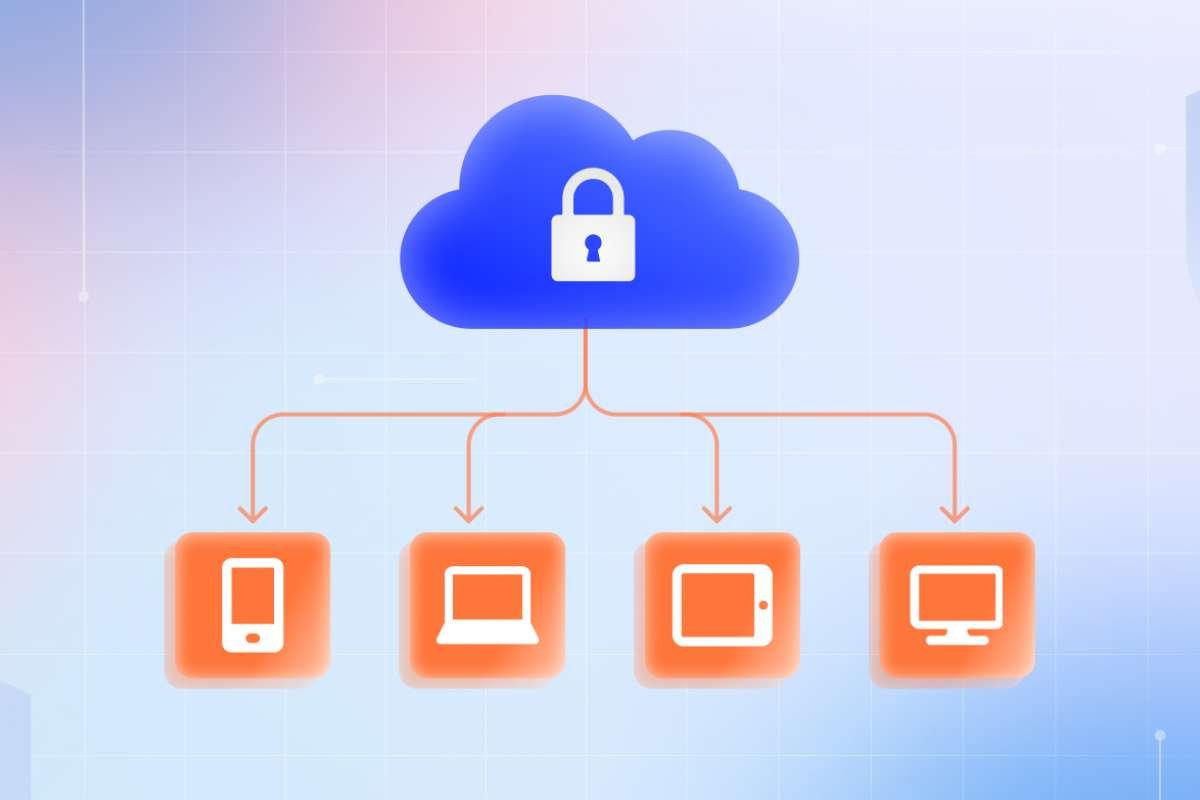[Source – sprinto.com]
The cloud access security broker has been a pivotal tool in bridging the gap between on-premise infrastructure and cloud service providers. Businesses have increasingly begun to rely on cloud services to protect sensitive information from cyber threats.
What this cloud access security broker does is act as a security enforcement point between the user and the various cloud applications—ensuring organizational cloud policies extend to the cloud environment. Whether businesses are utilizing Software as a Service (SaaS) like Salesforce or Infrastructure as a Service (IaaS) like AWS, CASBs offer essential security monitoring, risk management, and policy enforcement.
Let’s delve into the world of CASBs, understanding their functions and why they are indispensable for today’s businesses.
What is a Cloud Access Security Broker (CASB)?

A Cloud Access Security Broker (CASB) is a security solution positioned between cloud service users and providers, offering visibility, compliance, data security, and threat protection. CASBs help companies control the data that moves between their internal systems and cloud-based applications.
CASBs typically provide a variety of security services, including:
- Data Loss Prevention (DLP): CASBs monitor and control the data being stored and shared in the cloud to prevent data leaks.
- Threat Protection: By using advanced analytics and monitoring, CASBs detect and prevent malware attacks and other cyber threats targeting cloud infrastructure.
- Compliance Management: CASBs help businesses ensure they are in compliance with regulations such as GDPR, HIPAA, and others that require strict data protection standards.
- Visibility and Monitoring: CASBs provide real-time visibility into cloud activity, allowing organizations to track data access, movement, and potential risks.
As companies transition more of their operations to the cloud, the need for tools like CASBs is becoming increasingly important. The primary goal of a Cloud Access Security Broker is to ensure that businesses can leverage the benefits of cloud services without sacrificing security.
Why is a Cloud Access Security Broker Necessary?
Organizations today face multiple challenges when migrating to the cloud. These include maintaining control over sensitive data, ensuring regulatory compliance, and mitigating the risks posed by unauthorized access or cyberattacks. CASBs are crucial for addressing these concerns, offering a comprehensive security layer that fills gaps in cloud security.
1. Data Security in the Cloud
The cloud provides scalability, flexibility, and cost-efficiency, but it also introduces new risks. Businesses must be vigilant about who can access their data and how that data is being used. Without visibility into cloud traffic, companies could inadvertently expose sensitive data or allow unauthorized access.
CASBs provide granular control over data access and usage, ensuring that sensitive information like customer records, intellectual property, or financial data is adequately protected. For instance, a CASB can enforce encryption policies to secure data as it moves between users and the cloud.
2. Managing Shadow IT
Shadow IT refers to the unauthorized use of cloud applications by employees without the knowledge or approval of the IT department. This is a significant problem for many organizations, as these unsanctioned applications may not adhere to the same security policies, leaving sensitive data exposed.
A Cloud Access Security Broker helps to combat shadow IT by providing complete visibility into all cloud applications in use, sanctioned or otherwise. CASBs can monitor the activity within these apps, enforcing security protocols and preventing data leaks.
3. Ensuring Compliance
Many industries are subject to strict regulations, such as HIPAA in healthcare or GDPR in Europe. Non-compliance can result in heavy fines or legal action. CASBs play a vital role in helping businesses meet regulatory requirements by ensuring that data is stored, accessed, and managed in compliance with industry standards.
With CASBs, organizations can set policies that enforce compliance rules across all cloud platforms, providing peace of mind that sensitive data is handled properly.
Key Features of a Cloud Access Security Broker (CASB)
1. Data Encryption
Data encryption is one of the core functions of a CASB. Encryption ensures that any data moving between an organization’s internal network and a cloud service is protected. Even if a cybercriminal intercepts the data, it will be unreadable without the appropriate decryption key.
CASBs also manage the encryption of data stored in the cloud, ensuring that only authorized individuals can access it. This is particularly important for companies dealing with sensitive customer data, financial records, or proprietary information.
2. Data Loss Prevention (DLP)
One of the biggest concerns for organizations using cloud services is the risk of data leaks or accidental exposure. CASBs address this issue by integrating DLP capabilities. These systems monitor cloud traffic to identify and prevent unauthorized sharing or transmission of sensitive data, such as social security numbers, credit card details, or other personally identifiable information (PII).
By detecting patterns in data usage and preventing risky actions, CASBs can avert potential data breaches before they happen.
3. Access Control
Controlling who has access to cloud applications and what they can do with the data is crucial for maintaining security. CASBs enforce policies that restrict access based on user roles, ensuring that only authorized personnel can access specific information or perform particular actions.
For example, a CASB can restrict an employee’s ability to download sensitive data or share it with external parties, protecting the organization from accidental or malicious data exposure.
4. Threat Protection
CASBs use advanced threat detection algorithms to identify suspicious activity and stop malware or unauthorized access in real-time. These solutions monitor cloud traffic for anomalies and block threats before they compromise sensitive data.
Through machine learning and AI-driven threat detection, CASBs can recognize emerging patterns and proactively respond to evolving security risks.
5. Visibility and Reporting
Organizations need visibility into their cloud environments to identify risks and take action. CASBs provide real-time monitoring and detailed reporting on all cloud activity, giving IT teams a comprehensive overview of data movement, user behavior, and security incidents.
This visibility helps businesses make informed decisions about their security posture and implement changes as needed.
Benefits of Implementing a Cloud Access Security Broker (CASB)

Integrating a Cloud Access Security Broker into an organization’s security architecture brings several benefits:
- Enhanced Security: CASBs strengthen cloud security by applying corporate policies, detecting threats, and protecting sensitive data across all cloud services.
- Increased Compliance: For companies dealing with sensitive data, CASBs ensure compliance with regulations like GDPR, HIPAA, or PCI DSS by enforcing security policies across cloud platforms.
- Reduced Shadow IT Risks: CASBs provide visibility into unsanctioned apps, allowing organizations to monitor and control cloud usage.
- Data Protection: Through encryption, DLP, and access controls, CASBs safeguard data, whether it’s being stored, shared, or processed in the cloud.
Challenges with Cloud Access Security Broker Implementation
While CASBs offer numerous advantages, there are some challenges to consider:
- Integration Complexity: Implementing a CASB requires integration with existing security infrastructure, which can be complex and time-consuming.
- User Adoption: Employees may resist using CASBs if they perceive them as limiting their productivity or flexibility when accessing cloud applications.
- Cost: While CASBs provide robust security, the upfront costs and ongoing maintenance can be expensive for small and medium-sized businesses.
Choosing the Right Cloud Access Security Broker (CASB)

When selecting a Cloud Access Security Broker, it’s essential to consider your organization’s unique needs and the specific capabilities of each solution. Key factors to evaluate include:
- Compatibility: Ensure the CASB integrates seamlessly with your existing cloud applications and on-premise systems.
- Scalability: Choose a CASB that can scale with your business as it grows and as your cloud adoption increases.
- Security Features: Look for comprehensive features such as encryption, DLP, access control, and threat protection.
- Ease of Use: The CASB should offer user-friendly interfaces and straightforward reporting tools to simplify management.
Finally, Should You Invest in Cloud Access Security Brokers?
As organizations increasingly adopt cloud services, the need for robust cloud security becomes paramount. Organizations are prioritizing robust security brokers, led by their ability to empower businesses to navigate the complex cloud space securely.
Investing in the right CASB solution can help your organization navigate cloud security while enjoying the full benefits of cloud services.










